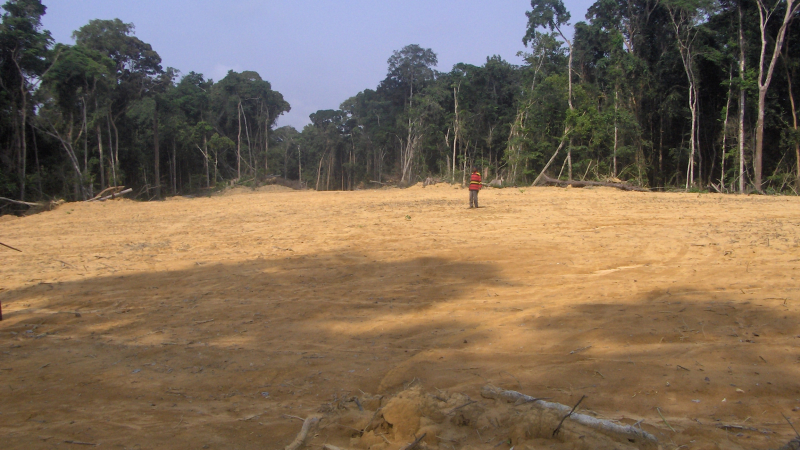Project – On record
This profile is no longer actively maintained, with the information now possibly out of dateBankTrack
Adina Matisoff, Friends of the Earth US, United States

Project – On record
This profile is no longer actively maintained, with the information now possibly out of dateBankTrack
Adina Matisoff, Friends of the Earth US, United States
What must happen
Environmental NGOs are demanding that:
- The contract between CMEC and the government be made public and subject to stakeholder input.
- The government provides adequate accountability over issues related to transparency, anti-corruption, and environmental social protections; and that the project comply with relevant national laws.
- The dam at Kongou Falls be resited to the Tsengué-Lélédi falls instead. This is a site that was recommended by a feasibility study conducted by Electricité de France, a public French company, in the 1960s but was never built. Environmental groups claim this would be cheaper and more beneficial for local communities.
- Financial Institutions varify the independent Social and Environmental Impact Assessment, and consider this in their decisions.
| Sectors | Hydroelectric Power Generation, Mining |
| Location |
|
The Belinga iron ore deposit is located 500km east of Gabon's coastal capital of Libreville, and is expected to produce some 30 million tons of iron ore annually. The project is the country's largest investment and one of the largest in the region. It will include building the Belinga iron ore facility, a deep-water port in Santa Clara and 560km of railroad track from Belinga to Santa Clara in order to export the iron ore. It also includes two hydroelectric dams to provide power to the Belinga facility.
Originally project costs were expected to be USD3.5billion; however, at the time the mineral rights agreement was reached in July 2008, it was reported to be around USD790 million.
Social and human rights impacts
Gabonese organizations such as Libreville-based Brainforest have expressed concern that the project would fall victim to government corruption, as has been the case for the country’s oil industry. Corruption has left Gabon mostly impoverished, despite its vast natural resources and the high price of commodities. For example, the Ministry of Mining has apparently authorized CMEC to begin building the road to Kongou Falls without approval from the Environment Ministry, raising concerns that proper legal and oversight processes are not being followed.
CMEC has garnered priveleges from the government of Gabon that many natural resource monitoring groups in Gabon worry will be highly detrimental to the country's sustainable economic and environmental development. For example, CMEC negotiated a 25-year tax holiday for the company even though the mine is projected to be profitable within 8-10 years.
Groups are demanding that the contract between CMEC and the Gabon government be made public and subject to stakeholder input. They have also demanded to see the government’s feasibility studies for the project, which claimed 30,000 jobs would be created, in order to clarify if those jobs would go to Gabonese or Chinese workers.
As the government of Gabon comes under pressure from CMEC to push the project forward, it is coming down increasingly hard on grassroots groups that critique the mine's potential impacts and lack of transparency. This has included suspending the legal operations of civil society groups, imposing travel bans of key activists and detaining individuals who raise concerns about government corruption in the project. The latest detentions came in December 2008, when national police arrested and detained 5 activists without warrant for almost two weeks before releasing the individuals with charges pending. One of those held was Marc Ona, a member of the multi-stakeholder committee implementing Gabon's Extractive Industries Transparency Initiative (EITI), an international initiative promoting increased transparency of revenues from oil, gas and mining.
Environmental and climate impacts
Environment Gabon, a coalition of local NGOs, has expressed concerns about the proposed site of one of the dams, Kongou Falls in Ivindo National Park. They are concerned that building the dam there would require declassifying the Park, opening it and other protected areas up to further development. There are also concerns about the biodiversity impacts of the project area in general, as the Belinga region area is ecologically sensitive, and home to threatened wild chimpanzees.
According to Environment Gabon, construction on a 42km road and worker camps have already begun, despite the fact that impact assessments have not been completed, as required by Gabonese law.
The Belinga project is being financed solely by the China Exim Bank from 2008 onward.
Previously, in 2002, Bank of China reportedly provided a RMB 8 billion line of credit for the project.
CMEC
ChinaVideo links
2011
2011-07-26 11:33:28 |
**Due to a lack of financing this project is currently on hold**
In late 2008 the environmental NGO Brainforest sent a letter to the China Exim Bank asking the bank to investigate allegations that its client, CMEC, was violating China Exim's environmental policy. Subsequently, China Exim Bank decided to pull financing from the Belinga project until the results of the impact assessments were verified. According to Marc Ona, head of Brainforest, the Chinese Ambassador to Gabon later told him that civil society issues and environmental impacts had prominently factored in Exim Bank's decision to hold off on the project, along with business factors such as the quality of the mine's iron ore.
Throughout 2008, the Gabonese government intimidated, harassed and detained Gabonese citizens who voiced their concerns about transparency and corruption in the country's extractive industries. The trial related to Marc Ona's December 2008 arrest was scheduled for May 2009. As the trial date approached, Marc Ona was allowed to travel to the United States to accept the 2009 Goldman environmental prize for outstanding environmental activism on 20 April.
